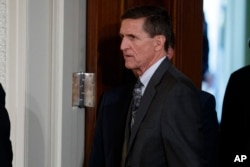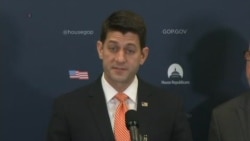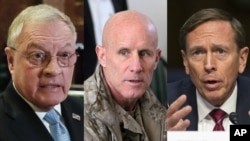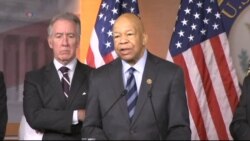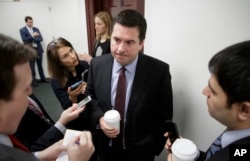The White House says President Donald Trump was advised nearly three weeks ago that national security adviser Michael Flynn had misled his vice president about controversial pre-inauguration contacts with a top Russian diplomat.
White House spokesman Sean Spicer, speaking Tuesday, said the president and his close advisers had been "reviewing and evaluating" that information on a "daily basis for a few weeks" before Flynn was forced to resign late Monday.
Spicer also told reporters that Trump was "immediately" informed on January 26 of the pre-inauguration contact between Flynn and Russian Ambassador Sergey Kislyak.
Ahead of Trump's January 20 inauguration, now-Vice President Mike Pence told CBS News' Face the Nation that Flynn and Kislyak did not discuss current U.S. sanctions against Russia for its role in the Ukraine crisis.
Pence also said Flynn and Kislyak "did not discuss anything having to do" with the decision in late December by the administration of former President Barack Obama to expel dozens of Russian diplomats. The Russians were sent home in response to allegations of Russian cyberspying against Democratic candidate Hillary Clinton during the 2016 presidential campaign.
Responding Tuesday to reporters' questions about the 18-day gap between the January 26 Trump briefing and Flynn's departure on Monday, Spicer said, "The president concluded he no longer had trust in his national security adviser."
Spicer also said Trump was pleased that Flynn had talked with the Russian diplomat, and said the president concluded there was nothing legally wrong with their discussions, even though Flynn was a private citizen at the time.
Misled vice president
Flynn acknowledged in his resignation letter that he had "inadvertently briefed" Pence and others with "incomplete information" regarding his phone calls with Kislyak in the weeks before Trump assumed power.
WATCH: House Speaker Ryan on Flynn's resignation
Even as the White House drama played out, Trump attempted to downplay its significance on Tuesday. He wrote on his Twitter account, "The real story here is why are there so many illegal leaks coming out of Washington? Will these leaks be happening as I deal on N. Korea etc?"
Key opposition Democratic lawmakers called for expanded investigations into links between Russia and Flynn and other key Trump aides, extending beyond the conclusion reached by the U.S. intelligence community last year that Russia interfered in the U.S. election.
"This. Is. Not. Normal," said Democratic Senator Elizabeth Warren, a vocal Trump critic.
After Flynn's resignation, Trump quickly named another retired Army general, Keith Kellogg, as his acting national security adviser, but also could pick former Central Intelligence Agency chief David Petraeus or former Navy Vice Admiral Robert Harward to fill the strategic position on a permanent basis.
Flynn and Kislyak, according to widespread U.S. news accounts, discussed the sanctions Obama imposed late last year.
Pence and Trump aides, relying on information from Flynn, said publicly that Flynn had not discussed lifting the sanctions, which are still in place. Flynn later acknowledged the issue may have come up.
Conversations such as those between Flynn and Kislyak possibly could have been a violation of a U.S. law that prohibits private citizens from conducting diplomatic affairs with a foreign government, because Trump had yet to take office.
Spicer said the White House concluded it was not a legal issue involving Flynn's contacts with Russia, but rather his misleading assertions to Pence.
Spicer said trust in Flynn "eroded to a point that we felt we had to make a change."
WATCH: Congressman Cummings on Flynn resignation
The U.S. Justice Department, according to The Washington Post, warned the White House last month that Flynn had so misrepresented his conversations with the Russian envoy that he might be vulnerable to blackmail by Moscow, as a result of the contradictions between the public descriptions of the calls and what intelligence officials knew based on their routine monitoring of communications by foreign officials in the United States.
Flynn, in his resignation letter, said he had apologized to both Trump and Pence, and that they had accepted his apology.
Kremlin spokesman Dmitri Peskov said Tuesday that Flynn's resignation "is the internal business of the Americans, it is the internal business of President Trump's administration. This is not our business."
But Russian lawmakers said Flynn's quick departure amounted to an attack on attempts to improve relations between Moscow and Washington.
Leonid Slutsky, who heads the Duma's foreign affairs committee, said Flynn's resignation was a "negative signal."
A member of the Duma, Konstantin Kosachev, who is chair of Russia's Foreign Affairs Committee, said, "Even a readiness to have a dialogue with Russians is seen by the hawks in Washington as a thought crime. Forcing the resignation of the national security adviser for contacts with the Russian ambassador, which is normal diplomatic practice, is not just paranoia but something immeasurably worse."
Democrats take issue
As a string of U.S. news accounts about Flynn's conversations were published, several Democratic senators called for an investigation of Flynn, while others urged Trump to fire him and for intelligence officials to review his security clearance.
Nine anonymous people described as current and former U.S. officials told the Post that Flynn and Kislyak explicitly discussed the sanctions placed on Russia by Obama after revelations that Russia had hacked into the computers of John Podesta, the campaign chief for Clinton.
The anti-secrecy group WikiLeaks released thousands of Podesta's emails in the weeks leading up to the election, many of them showing embarrassing, behind-the-scenes details of how Democratic operatives worked to ease Clinton's path to the Democratic presidential nomination.





